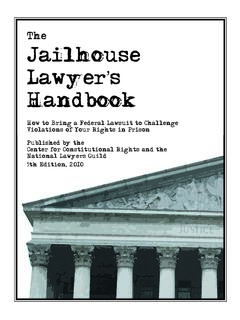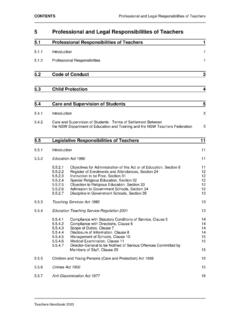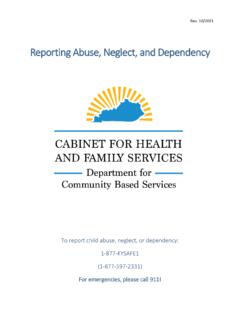Transcription of Commissioner of Oaths Handbook - FCNB
1 Commissioner of Oaths Handbook2 | Commissioner of Oaths HandbookTABLE OF CONTENTSA. Introduction 3B. Definitions 4C. General 6D.
2 Persons authorized to take Oaths , affirmations or statutory declarations 7E. What is an oath or affirmation? 8F. How to administer an oath to an individual making an affidavit 9G. How to administer an affirmation to an individual making an affidavit 10H. How to administer a statutory declaration 11I.
3 Special circumstances 12J. Powers 15K. Revocation of appointments 15L. Fees 15M.
4 Quicklist Dos and Don ts 16N. Legislation 17 Appendix A 18 Example of Affidavit 18 Appendix B
5 21 Example of Declaration 21 Appendix C 23 Interpretation Act 23 Appendix D 24 Evidence Act 24 Appendix E 25 Rules of Court of New Brunswick
6 25 Appendix F 28 Canada Evidence Act 28 Commissioner of Oaths Handbook | 3A. INTRODUCTIONThe purpose of this Handbook is to provide guidance on the process and procedures for Commissioners for Taking Affidavits in the Province of New Brunswick. The guidelines contained in this Handbook are in relation to the requirements set out in the Commissioners for Taking Affidavits Act, 2011, c.
7 127, the Canada Evidence Act, , 1985, c. C-5, the Evidence Act, 1973, c. E-11 and the Rules of Court for the Province of New Brunswick. Unless otherwise authorized by law, individuals wishing to be appointed as a Commissioner of Oaths in the Province of New Brunswick must complete an Application for Appointment as a Commissioner of Oaths , pass an oral examination based on the information contained in this Handbook with the Clerk of the Court and pay the requisite fee (if applicable). In order to be eligible to make an application, the applicant must be a Canadian citizen who is at least 19 years of age and who is free of any criminal convictions relevant to the appointment.
8 Applications are made to the Consumer Affairs Division of the Financial and Consumer Services Commission, 200-225 King Street, Fredericton, New Brunswick E3B 1E1, telephone 1-866-933-2222. The Commission is responsible for the administration of the Commissioners for Taking Affidavits Act Should you have any questions concerning rights, responsibilities or requirements under the law you should seek your own independent legal advice. 4 | Commissioner of Oaths HandbookB. DEFINITIONSA ffidavit An affidavit is a voluntary statement of facts made by an individual that is written down and sworn or affirmed before a person authorized to administer an affidavit should only be completed when it is either: (a) intended to be used for court purposes, or (b) is authorized by a statute or regulation.
9 An example of an affidavit is included at Appendix A Statutory Declaration/Solemn DeclarationA statutory declaration is a written statement that attests, under penalty of perjury, to facts known by the individual and is made in accordance with (or under the authority of) the Canada Evidence Act, the Evidence Act (New Brunswick), or other similar person making a statutory declaration confirms the statements made in the document by solemnly declaring their truth. The terms solemn declaration and statutory declaration may be used interchangeably.
10 An example of a statutory declaration is included at Appendix B Deponent/DeclarantA deponent is a person who swears or affirms an affidavit. A declarant is a person who makes a statutory of Oaths Handbook | 5 JuratA jurat is the certification at the end of the affidavit or statutory declaration stating when and before what authority the affidavit or statutory declaration was made. This part of an affidavit or statutory declaration is completed by the Commissioner of Oaths whereby the Commissioner of Oaths certifies three things: 1 That the person signing the document did so in their presence; 2 That the person signing appeared before them on the date and at the place specified.





